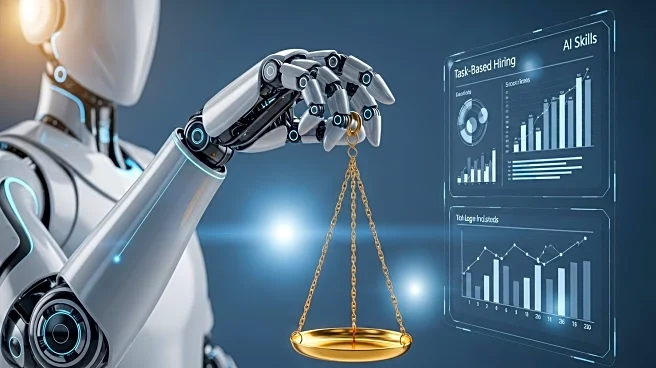What's Happening?
Recent data from PwC's 2025 AI Jobs Barometer indicates that workers possessing artificial intelligence skills are earning significantly higher salaries, with increases up to 56% compared to the previous year. This trend is observed across various sectors, including marketing, finance, human resources, and education, where roles are increasingly AI-enabled. The demand for AI skills is not limited to technical positions; employers are offering salary incentives for candidates with AI competencies even in traditionally non-technical roles. According to research by Lightcast, job ads requiring AI skills advertised a 28% premium, equivalent to nearly $18,000 per year, with the premium rising to 43% for listings specifying multiple AI skills. This shift highlights the growing importance of AI literacy as companies strive to keep pace with automation and address talent gaps.
Why It's Important?
The increasing value placed on AI skills reflects a broader shift towards task-based hiring, where AI-enabled work automates routine tasks and requires adaptability from human workers. Skills such as prompt engineering, critical thinking, and AI judgment are becoming more valuable than traditional credentials. This transition is significant as it signals a move towards a skills-first economy, where workers who can effectively utilize AI tools across business functions are rewarded with top-of-market compensation. However, this shift raises concerns about equity, as many workers, particularly outside the tech industry, have yet to acquire these skills. The disparity in AI proficiency could lead to a widening gap in workforce opportunities and compensation.
What's Next?
As AI skills continue to command higher salaries, employers may increasingly prioritize these competencies in hiring decisions, potentially reshaping job markets across various industries. Companies might invest more in training programs to upskill their workforce, ensuring they remain competitive in an AI-driven economy. Additionally, HR systems may need to adapt to better identify and reward AI talent, addressing the challenges posed by the rapid integration of AI into business operations. The long-term implications could include a shift in educational priorities, with institutions focusing more on AI-related curricula to prepare students for the evolving job landscape.
Beyond the Headlines
The emphasis on AI skills could lead to ethical and cultural shifts within organizations, as the integration of AI tools necessitates new approaches to decision-making and problem-solving. The reliance on AI may also prompt discussions about the balance between human judgment and machine automation, particularly in roles that require ethical considerations. Furthermore, the growing demand for AI proficiency might influence immigration policies, as countries compete to attract skilled workers in this field. The transformation towards a skills-first economy could redefine professional identities, with AI literacy becoming a key component of career advancement.









